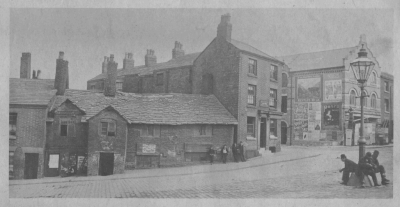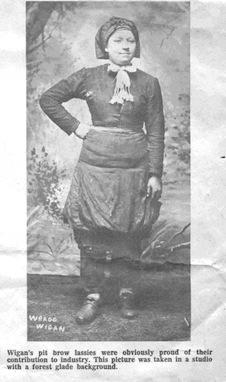Thomas Aspinwall (1846 - 1901)
A short biography of a well respected Miners Agent
I first became interested in Thomas Aspinwall when a family member tracing our ancestry discovered that contrary to information passed down from the previous generation my paternal grandmother's surname at birth was Aspinwall. I was already aware of the Skelmersdale, Bickerstaffe, Rainford link and had just seen the Aspinwall memorial tablet in Wigan Infirmary with similar connections. It turned out that Thomas Aspinwall was my grandmother's uncle and naturally I became intrigued to find out more about this apparently great man, a family member you could be proud of. This is a rather sketchy precis of his story. Thomas Aspinwall was born in Bickerstaffe in 1846 the younger of three sons of James and Margaret Aspinwall. Some time before 1860 his family moved to Skelmersdale and in 1861 were living at 43 Sandy Lane there, his immediate family were:-
Father - James Aspinwall aged 51 Head Coal Miner and Beer seller born in Lathom
Mother - Margaret Aspinwall aged 55 Wife born Rainford
Brother - John Aspinwall unmarried aged 24, Servant (footman) born Skelmersdale.
Brother - James Aspinwall unmarried aged 18, Coal Miner born Bickerstaffe
Himself - Thomas Aspinwall unmarried aged 15, Coal Miner born Bickerstaffe
 He went to work at the age of 14 in the collieries of Messrs. Bromilow Forster and Co. being elected the miners check-weighman in 1873. In 1880 after a strike, the mine owners objected to his return to work because of his advocacy on behalf of the men. The employer's right to dismiss the check-weighman was contested but the local magistrates upheld the employer's contention that according to the act of 1872 Aspinwall, although properly elected could not enforce his claim to act as check-weighman as he was not employed at the mine at which he was elected. Cases like this led to the amending act of 1887, which allowed the men to choose any person they thought fit to act as their check-weighman. Meanwhile Aspinwall was chosen miners' agent for Skelmersdale and became a member of the Skelmersdale Local Board. In 1887 he was chosen to succeed William Pickard as agent to the Wigan, Pemberton, Standish, Aspull and Blackrod Miners' Union, he also became Vice President of the Lancashire and Cheshire Miners' Permanent Relief Fund. In the same year he was appointed Overseer of the Township and retained his membership of the Skelmersdale Board. A keen reformer he was a strong supporter of the Royal Albert Edward Infirmary in Wigan from its inception becoming a vice president.
He went to work at the age of 14 in the collieries of Messrs. Bromilow Forster and Co. being elected the miners check-weighman in 1873. In 1880 after a strike, the mine owners objected to his return to work because of his advocacy on behalf of the men. The employer's right to dismiss the check-weighman was contested but the local magistrates upheld the employer's contention that according to the act of 1872 Aspinwall, although properly elected could not enforce his claim to act as check-weighman as he was not employed at the mine at which he was elected. Cases like this led to the amending act of 1887, which allowed the men to choose any person they thought fit to act as their check-weighman. Meanwhile Aspinwall was chosen miners' agent for Skelmersdale and became a member of the Skelmersdale Local Board. In 1887 he was chosen to succeed William Pickard as agent to the Wigan, Pemberton, Standish, Aspull and Blackrod Miners' Union, he also became Vice President of the Lancashire and Cheshire Miners' Permanent Relief Fund. In the same year he was appointed Overseer of the Township and retained his membership of the Skelmersdale Board. A keen reformer he was a strong supporter of the Royal Albert Edward Infirmary in Wigan from its inception becoming a vice president.
 He was a very skilled communicator and tireless in pursuit of improved conditions and safety in the mines, and protecting miners from the worst extremes of market forces. Very active in the Miners' Federation the forerunner of the present trade union he regularly addressed meetings of miners and their representatives in all parts of the country, in 1891 addressing the International Miners' conference in Paris and giving evidence to the Royal Commission on mining royalties. Also in 1891 he was accepted as the liberals labour candidate for Wigan and unsuccessfully contested two elections in 1892 and 1895. Thomas Aspinwall died aged 54 at his home in Skelmersdale in 21st March 1901, he is buried in the local parish church of St Paul there, where he had been a regular attender and sidesman. His grave is marked with a large marble obelisk reflecting his standing in the community at the time of his death.
He was a very skilled communicator and tireless in pursuit of improved conditions and safety in the mines, and protecting miners from the worst extremes of market forces. Very active in the Miners' Federation the forerunner of the present trade union he regularly addressed meetings of miners and their representatives in all parts of the country, in 1891 addressing the International Miners' conference in Paris and giving evidence to the Royal Commission on mining royalties. Also in 1891 he was accepted as the liberals labour candidate for Wigan and unsuccessfully contested two elections in 1892 and 1895. Thomas Aspinwall died aged 54 at his home in Skelmersdale in 21st March 1901, he is buried in the local parish church of St Paul there, where he had been a regular attender and sidesman. His grave is marked with a large marble obelisk reflecting his standing in the community at the time of his death.  Very large numbers including dignitaries from all walks of life are reported to have attended the funeral, which was delayed until the early evening to allow working miners to pay their respects. A memorial tablet to his memory was commissioned from J Alberti of Manchester and erected at the Royal Albert Edward Infirmary in 1903, it can still be seen in a quiet corridor there today. The inscription reads:- In his prosperous hours he had but this pride, to be the weak man's help the poor man's guide.
Very large numbers including dignitaries from all walks of life are reported to have attended the funeral, which was delayed until the early evening to allow working miners to pay their respects. A memorial tablet to his memory was commissioned from J Alberti of Manchester and erected at the Royal Albert Edward Infirmary in 1903, it can still be seen in a quiet corridor there today. The inscription reads:- In his prosperous hours he had but this pride, to be the weak man's help the poor man's guide.
Source: "THE MINERS", A History of the Miner's Federation of Great Britain 1889 - 1910 by R Page Arnott
In his prosperous hours he had but this pride to be the weak man's help, the poor man's guide






